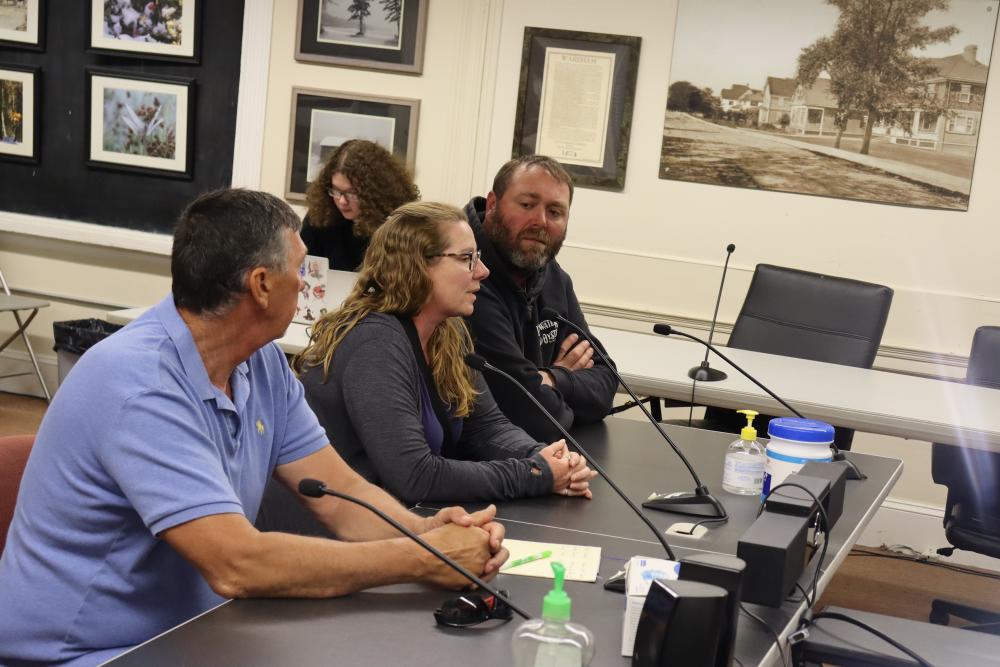Town stands up for shellfishers
Shellfishers of Wareham have sounded the alarm about a review of Buzzard Bay’s waters that could have a negative impact on the town’s shellfishing industry.
Gary Buckminster, Director of Natural Resources with the Town of Wareham, explained the dangers on the horizon at a Select Board meeting on Tuesday, June 4.
Buckminster said the federal Food and Drug Administration, as part of a national shellfish sanitation program, will be reviewing wastewater treatment plants and their effect on shellfish populations. The Massachusetts Division of Marine Fisheries has the task of conducting that review in Buzzards Bay.
A review has already been conducted on the impact of New Bedford’s sewer system on its adjoining waters, resulting in a “pretty tremendous shutdown” on that region’s shellfishing, Buckminster said. He said research could start on an equivalent review in Wareham as soon as December.
The review uses computer modeling to show particle movement through the waterways to see the distribution of material from wastewater treatment plants, Buckminster said.
“We don’t feel that they’re doing all the research that could possibly be done to try to minimize the impact [that] we could potentially be seeing,” he added. “We have shellfish growers that are actually sitting there wondering if they’re going to have a business in two years.”
Select Board Member Sherry Quirk asked for clarification: “What you’re looking for is that whatever limitations are placed on oyster growing are based on fact and science as opposed to what may seem like a bit of conjecture, is that correct?”
“Absolutely,” said Buckminster. “We want to do the right thing, but we want to make sure they’re doing the right thing also.”
Shellfishers from around Wareham voiced their concerns about the potential impact of the review on their businesses. While they acknowledged it was important to keep their product safe, they questioned the accuracy of the data and the modeling the FDA is using for its review.
Specifically, several people said the model used for the review has not been “ground tested,” a process whereby a projection from the model is tested against real-world data.
Pamella Reitsma, with Crooked Cove Sea Farm, said the area she farmed has been farmed for oysters for over a hundred years.
“The hard part that we have with all of this is that there's no instance of people being sick,” said Reitsma.
“We’re in support of sound science and protecting people’s health,” she added. “And so if this was coming from a place where people were getting sick, I feel like we would also be in support of it.”
The issue, she said, is that the FDA is imposing new pressures on the region’s shellfishers without cause.
“We can’t let this town be shut down for shellfishing,” said fisherman Dennis Pittsley. “Can you imagine our beautiful town, closed, all of it?”
“We just need your help to talk to certain people and make sure this doesn’t happen,” Pittsley said.
Korrin Peterson, the Vice President of Clean Water Advocacy with the Buzzards Bay Coalition, echoed the concerns raised by Buckminster.
Peterson said that Wareham’s sewer treatment plant does an “outstanding job” processing its wastewater for nitrogen and bacteria, and that the Coalition supports Buckminster’s concerns.
“We do also want to make sure that all the facts and science are driving these actual closures,” she said.
The Select Board wrote a letter to send to the town’s representatives about the issue.
“The proposed regulations will put the livelihoods of our aquaculture farmers in jeopardy,” the letter read, in part. It mentioned that Wareham’s waters are fished by third-generation shellfishers, and that shellfish from Wareham is sold across the country.
“While we recognize the importance of the computer modeling being used, we are concerned with the lack of data that should support such models,” the letter read.
It asked for the model to be “ground truthed” and for a report to be prepared with the data used.
Whiteside added, “I support the fact that the industry has been in this town for more than a hundred years. There are several generational grants out there, and it would be a shame, in my opinion, to have non-facts shut down a fishery.”















